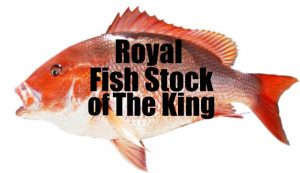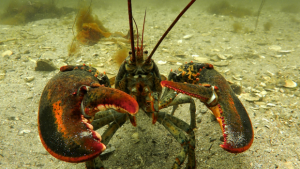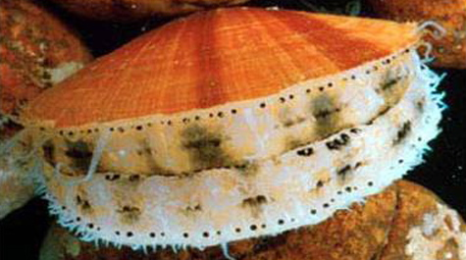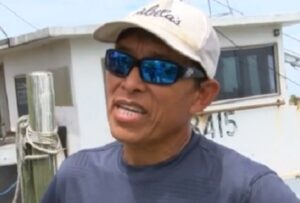Tag Archives: Ocean Conservancy
Nominee to Bering Sea fisheries council would tip balance toward tribes, away from trawlers
Tribal and environmental advocates calling for a crackdown on salmon and halibut bycatch are set to gain a new ally on the federal council that manages Alaska’s lucrative Bering Sea fisheries. Washington Democratic Gov. Jay Inslee last week nominated Becca Robbins Gisclair, an attorney and conservation advocate, to the North Pacific Fishery Management Council. If U.S. Commerce Secretary Gina Raimondo accepts Inslee’s recommendation, Gisclair, senior director of Arctic programs at the environmental advocacy group Ocean Conservancy, would assume one of the council’s 11 voting positions. Inslee’s choice comes amid an intense fight at the council about tighter regulation of bycatch, and after what advocates described as a last-minute flurry of lobbying in an effort to convince Inslee to pick an ally of one side or the other in that dispute. more, >>click to read<< 13:42

6 Ocean Priorities for the Biden Administration from the Environmentalist
Since President-elect Biden was voted into office last November, he and his team have been sharing what they want to accomplish in their first 100 days in office.,, In the midst of any political transition, it is easy for environmental issues to be pushed aside in the name of more “urgent” issues. Fortunately, the new administration has given us promising signals that environmental action is high on their to-do list. Here are six things that must be prioritized in the coming weeks and months,,, >click to read< 09:48

Agreement reached in lawsuit over extension of red snapper season
The U.S. Department of Commerce has reached an agreement with two environmental advocacy groups that took it to court over a decision to extend the recreational red snapper fishing season by 39 days in the Gulf of Mexico. Under the agreement, approved Wednesday, 20 December by U.S. District Judge Amy Berman Jackson, the government announced that the extension of the 2017 season “was a one-time action” it has opted not to defend the decision at this time. Further, government officials plan to give a 2018 recreational red snapper season projection by early February and finalize the length of the season around 20 April. Ocean Conservancy and the Environmental Defense Fund,,, click here to read the story 09:54
Conservation groups sue to stop snapper season extension
 Several conservation groups have filed a lawsuit against the federal extension of red snapper season recently announced by the U.S. Department of Commerce. In the suit, the groups said the decision jeopardizes the ongoing recovery of Gulf red snapper by increasing the federal private angler fishing season thirteen-fold. Chris Dorsett, vice president of conservation policy and programs for the Ocean Conservancy (one of the groups involved in the suit), spoke out against the extension of the federal season.,,, “This lawsuit is without merit,” Byrne said. “A lot of work went into this emergency rule put forward by the Department of Commerce. They went through a lot of study and worked with the individual Gulf states to get the state seasons in line with the federal seasons. The Department of Commerce did their homework here, and I have confidence that this lawsuit from a liberal Washington, D.C. environmental group will not ultimately be successful.” click here to read the story 09:18
Several conservation groups have filed a lawsuit against the federal extension of red snapper season recently announced by the U.S. Department of Commerce. In the suit, the groups said the decision jeopardizes the ongoing recovery of Gulf red snapper by increasing the federal private angler fishing season thirteen-fold. Chris Dorsett, vice president of conservation policy and programs for the Ocean Conservancy (one of the groups involved in the suit), spoke out against the extension of the federal season.,,, “This lawsuit is without merit,” Byrne said. “A lot of work went into this emergency rule put forward by the Department of Commerce. They went through a lot of study and worked with the individual Gulf states to get the state seasons in line with the federal seasons. The Department of Commerce did their homework here, and I have confidence that this lawsuit from a liberal Washington, D.C. environmental group will not ultimately be successful.” click here to read the story 09:18
Environmental groups suing Trump administration for extending red snapper season
 Two environmental groups are suing the Trump administration for stretching the red snapper season in the Gulf of Mexico. The federal government said the economic benefit from allowing weekend fishing this summer by recreational anglers in federal waters outweighs the harm to the red snapper species, which is still recovering from disastrous overfishing. Gulf state officials had lobbied for and praised the change, but the lawsuit says the decision violated several laws by ignoring scientific assessments, promoting overfishing, and failing to follow required procedures. It was filed Monday for the Ocean Conservancy and the Environmental Defense Fund. click here to read the story 13:13
Two environmental groups are suing the Trump administration for stretching the red snapper season in the Gulf of Mexico. The federal government said the economic benefit from allowing weekend fishing this summer by recreational anglers in federal waters outweighs the harm to the red snapper species, which is still recovering from disastrous overfishing. Gulf state officials had lobbied for and praised the change, but the lawsuit says the decision violated several laws by ignoring scientific assessments, promoting overfishing, and failing to follow required procedures. It was filed Monday for the Ocean Conservancy and the Environmental Defense Fund. click here to read the story 13:13
Natural Resources Defense Council and the Ocean Conservancy – Ocean acidification poses threat to lobsters
 The Nature Climate Change study, which was led by researchers at the environmental groups the Natural Resources Defense Council and the Ocean Conservancy, set out to go beyond global models by identifying local risk factors. “They weren’t previously factored into the conversation,” Lisa Suatoni, senior scientist at the NRDC and a co-author of the report, said. “There are a lot more places at risk than conventional wisdom tells us.” Those places include New England and the Gulf of Mexico, as well as the Pacific Northwest, where the effects of acidification have already caused serious problems. Read the article here 08:01
The Nature Climate Change study, which was led by researchers at the environmental groups the Natural Resources Defense Council and the Ocean Conservancy, set out to go beyond global models by identifying local risk factors. “They weren’t previously factored into the conversation,” Lisa Suatoni, senior scientist at the NRDC and a co-author of the report, said. “There are a lot more places at risk than conventional wisdom tells us.” Those places include New England and the Gulf of Mexico, as well as the Pacific Northwest, where the effects of acidification have already caused serious problems. Read the article here 08:01
New Tool Aims To Help Scallop Fishery Adapt To Climate Change
 Researchers with the Woods Hole Oceanographic Institution (WHOI), National Oceanic and Atmospheric Administration (NOAA), and the nonprofit Ocean Conservancy that analyzes data on changes in the ocean, the scallop population, and the economy. The tool is unique, according to Jon Hare, director of the NOAA fisheries lab in Narragansett. He said the goal is to give scallop fisheries the chance to prepare for climate change, and “use this model to evaluate how the population would respond to ocean acidification and changes in management.” Read the rest here 12:05
Researchers with the Woods Hole Oceanographic Institution (WHOI), National Oceanic and Atmospheric Administration (NOAA), and the nonprofit Ocean Conservancy that analyzes data on changes in the ocean, the scallop population, and the economy. The tool is unique, according to Jon Hare, director of the NOAA fisheries lab in Narragansett. He said the goal is to give scallop fisheries the chance to prepare for climate change, and “use this model to evaluate how the population would respond to ocean acidification and changes in management.” Read the rest here 12:05
Securing the supply of sea scallops for today and tomorrow
 Good management has brought the $559 million United States sea scallop fishery back from the brink of collapse over the past 20 years. However, its current fishery management plan does not account for longer-term environmental change like ocean warming and acidification that may affect the fishery in the future. A group of researchers from Woods Hole Oceanographic Institution (WHOI), National Marine Fisheries Service, and Ocean Conservancy? hope to change that. Read the rest here 17:18
Good management has brought the $559 million United States sea scallop fishery back from the brink of collapse over the past 20 years. However, its current fishery management plan does not account for longer-term environmental change like ocean warming and acidification that may affect the fishery in the future. A group of researchers from Woods Hole Oceanographic Institution (WHOI), National Marine Fisheries Service, and Ocean Conservancy? hope to change that. Read the rest here 17:18
Walton Family Foundation Dumped $91.4 Million Into Greenwashing in 2012: Walmarting the Rivers and Oceans
 Walmart has been in the headlines in recent weeks after the retailer announced plans to keep its stores open this Thanksgiving, forcing Walmart employees to cancel many of their holiday plans. Walmart, the country’s largest retailer and employer, makes more than $17 billion in profits annually, so it has a lot of money to dump into “environmental” groups that serve its agenda of privatization of the public trust. The wealth of the Walton family totals over $144.7 billion – equal to that of 42% of Americans. must read more@truthout.org 17:22
Walmart has been in the headlines in recent weeks after the retailer announced plans to keep its stores open this Thanksgiving, forcing Walmart employees to cancel many of their holiday plans. Walmart, the country’s largest retailer and employer, makes more than $17 billion in profits annually, so it has a lot of money to dump into “environmental” groups that serve its agenda of privatization of the public trust. The wealth of the Walton family totals over $144.7 billion – equal to that of 42% of Americans. must read more@truthout.org 17:22
Happy Anniversary to Vital Ocean Policy – Andreas Merkl – President and CEO of Ocean Conservancy

This policy directly addresses the key challenge of our time: how to meet the enormous resource demands of a rapidly growing global population without destroying the natural systems that sustain us. The ocean, of course, is at the center of every aspect of this challenge—food, energy, climate and protection of our natural resources. continued@natgeo
Red snapper off overfishing list – Ocean Conservancy and the Pew Charitable Trusts report described as “propaganda.”
The News Herald -PANAMA CITY BEACH — After 13 years on the federal overfishing list, red snapper has been removed after a report showed the species has made a comeback in the Gulf of Mexico. . “The critical list that it’s still on is the overfished designation,” said local charter captain Bob Zales. “Many of us believe we’re past that and this fishery is not overfished anymore.”Zales described the report, a collaboration between the Ocean Conservancy and the Pew Charitable Trusts, as “propaganda.”Released in conjunction with a fisheries summit set to begin today in Washington, D.C., the document hails the Magnuson-Stevens Act, the law governing fishery management in the U.S. continued
Why Aren’t Environmental Groups Divesting from Fossil Fuels? Some of big green’s most powerful players still invest in energy companies.
THEY ARE STEALING OUR OCEAN. FOR PROFIT!!! SOME BUYING FISH QUOTA!!Why do some of the largest environmental organizations still invest in fossil fuels? As outlined in my new piece, Time for Big Green to go Fossil Free, organizations such as The Nature Conservancy and the Wildlife Conservation Society aren’t taking the simple step of divesting their large endowments and publicly traded investments from energy corporations. Below is a cheat sheet (not comprehensive) for how much money big green groups are investing and for who is—and who isn’t—getting their financial house in order. continued













































